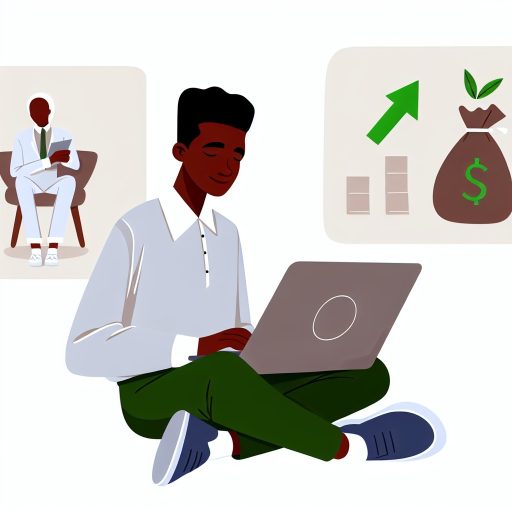Introduction to Task Aggregator Platforms
What Task Aggregator Platforms Are
Task aggregator platforms connect service providers with customers efficiently.
They act as digital marketplaces for various types of freelance and gig work.
Users can find jobs or services ranging from delivery to graphic design on these platforms.
Moreover, they simplify the process of matching skills with demand.
Emergence of Task Aggregator Platforms in Nigeria
The rise of internet penetration has fueled the growth of these platforms in Nigeria.
Companies like NaijaTaskHub and LagosGig connect thousands of Nigerians daily.
Consequently, they have become vital for many seeking flexible work opportunities.
Additionally, these platforms empower youth and entrepreneurs across cities and rural areas.
Factors Driving Adoption
The high unemployment rate motivates many Nigerians to seek alternative income sources.
Furthermore, mobile technology advancements have made access more convenient.
These platforms also benefit from Nigeria’s large informal economy.
Therefore, they serve as an innovative solution to bridge gaps in traditional employment.
Contributions of Task Aggregator Platforms to Economic Growth
Task aggregator platforms contribute significantly to job creation nationwide.
They help formalize gig work and increase earnings for independent workers.
Moreover, small businesses gain easier access to affordable services through these platforms.
Personalized Financial Consulting – Tailored for You
Get a custom financial plan made just for you in 1-3 days. Clear strategies, actionable steps, and unlimited revisions.
Get StartedThey stimulate economic activities and promote digital inclusion in Nigeria.
How Task Aggregator Platforms Bridge the Gap Between Service Providers and Consumers
Connecting Service Providers with Potential Clients
Task aggregator platforms actively link skilled service providers to consumers in need.
They provide a centralized space where clients can discover professionals quickly.
Platforms like HandyNaira and TaskHive feature diverse service listings across Nigeria.
This visibility boosts opportunities for freelancers such as Emeka and Adaora to gain clients.
Consequently, service providers enjoy broader outreach without extensive marketing efforts.
Simplifying the Hiring Process for Consumers
Consumers benefit from an easy-to-navigate interface that clearly displays available services.
These platforms offer detailed profiles including qualifications and ratings of providers.
Therefore, users such as Chinedu or Amina can confidently choose trustworthy professionals.
Additionally, integrated communication tools enable direct interaction before hiring.
Thus, clients save time by avoiding tedious searches and background checks.
Enhancing Trust Through Reviews and Ratings
Task aggregators incorporate review systems that promote transparency and accountability.
Clients leave honest feedback based on their experience with providers like Emeka or Ifeoma.
This feedback encourages improved service quality among providers competing on the platform.
Unlock Your Path to Financial Freedom
Personalized savings and investment strategies tailored to your financial goals. Let's help you take control of your future with a plan designed just for you.
Get StartedFurthermore, new users rely on these ratings to make informed hiring decisions.
Consequently, trust builds quickly between parties fostering repeat engagements.
Providing Secure Payment and Dispute Resolution
Platforms offer secure payment gateways that protect both clients and providers financially.
For instance, TaskBridge ensures funds are held until job completion guaranteeing fairness.
They provide support channels to resolve disputes promptly and fairly.
This system reduces potential risks for both Tunde, a service provider, and his clients.
Therefore, confidence grows when using these platforms for various tasks.
Empowering Local Economies and Skill Development
By connecting service providers with demand, task aggregators stimulate local economic growth.
Freelancers enhance their skills through diverse job opportunities offered via these platforms.
For example, Lola improved her graphic design business after joining QuickTask Nigeria.
This ecosystem fosters entrepreneurship and contributes to Nigeria’s digital economy.
Ultimately, task aggregators become vital tools for empowerment and progress nationwide.
The impact of task aggregator platforms on employment opportunities for Nigerians
Expanding access to diverse job opportunities
Task aggregator platforms connect Nigerians with a wide range of jobs across various industries.
They enable individuals in cities like Lagos and Abuja to find freelance and remote work easily.
Take Control of Your Debt Today
Struggling with debt? Get personalized strategies to pay off your debts, negotiate with creditors, and rebuild your credit. Your path to financial freedom starts here.
Get HelpPlatforms such as WorkHub Nigeria and KareAgent offer numerous short-term and long-term tasks.
Consequently, these platforms reduce the barriers to entry for many job seekers across the country.
By providing access to gig work, they empower unemployed youths to generate income promptly.
Supporting small business and entrepreneurial growth
Task aggregators also help small businesses like BrightTech Solutions to outsource tasks affordably.
They allow entrepreneurs to focus on growth while delegating routine duties through these platforms.
This support creates indirect employment as business owners hire Nigerians for tasks of varying complexity.
In addition, platforms such as TaskHive facilitate collaboration between freelancers and startups nationwide.
Thus, they foster an ecosystem where innovative ventures can thrive and expand employment opportunities.
Enabling skill development and capacity building
Many Nigerians acquire new skills by engaging with diverse assignments on aggregator platforms.
For example, Chima, a graphic designer from Ibadan, advanced her skills through project-based jobs.
Platforms often provide feedback mechanisms that help users improve the quality of their work.
Furthermore, these experiences build professional portfolios essential for securing higher-paying roles.
Hence, task aggregators serve as practical training grounds for career advancement across sectors.
Promoting flexible and inclusive work arrangements
Task aggregator platforms offer flexible schedules that accommodate different lifestyles and needs.
They support stay-at-home parents like Nkechi to balance family and work commitments efficiently.
This flexibility particularly benefits individuals with physical disabilities seeking meaningful employment.
Additionally, these platforms reduce geographical constraints by connecting talent from rural areas.
Therefore, they contribute to a more inclusive Nigerian workforce with diverse participation.
Addressing challenges for sustainable employment impact
Despite their benefits, task aggregator platforms face challenges related to job security for workers.
Many freelancers experience inconsistent income and limited access to social protection schemes.
Furthermore, platforms must ensure transparency and fair payment systems for all participants.
Improving digital literacy remains crucial to maximize engagement from underprivileged communities.
Addressing these issues will enhance the overall positive impact on employment opportunities in Nigeria.
See Related Content: How to Avoid Scams in Online Paid Tasks in Nigeria
Key Features and Functionalities of Popular Task Aggregator Platforms in Nigeria
Overview of Task Aggregator Platforms
Task aggregator platforms connect freelancers with clients seeking services.
They simplify the process of finding and completing tasks in various industries.
In Nigeria, these platforms have grown rapidly due to increased digital adoption.
Below, we explore the features and functionalities of leading platforms such as Asuqu, Workvana, and Gigtask.
User-Friendly Interface and Accessibility
Asuqu offers an intuitive interface that simplifies task posting and application.
Workvana includes mobile-friendly features, making it accessible on smartphones.
Gigtask provides multilingual support, catering to Nigeria’s diverse languages.
Therefore, users experience seamless navigation and faster task matching.
Comprehensive Task Categories
Platforms cover a broad range of categories including writing, design, and delivery.
Workvana also includes technical jobs such as software development and engineering.
Gigtask provides unique categories for local services like event planning and tutoring.
This variety enables users to find opportunities that align with their skills.
Secure Payment Systems
All platforms use integrated payment gateways for safe and quick transactions.
Asuqu supports local payment methods like Paystack and Flutterwave.
Workvana offers escrow services, which protect both clients and freelancers.
Consequently, users can trust the platforms to handle funds fairly and promptly.
Real-Time Communication Tools
Platforms include chat features that enable instant communication between users.
Gigtask facilitates video calls for project discussions and clarifications.
These tools enhance collaboration and improve task outcomes effectively.
Rating and Review Systems
Workvana incorporates a rating system to help clients choose reliable freelancers.
Asuqu allows freelancers to review clients, fostering mutual accountability.
Gigtask highlights top-rated users, which boosts trust across the platform.
Thus, the review system maintains quality and encourages professionalism.
Task Tracking and Notification Features
Users receive timely notifications about new tasks and application statuses.
Workvana includes dashboards that monitor task progress and deadlines.
Asuqu sends alerts for overdue tasks to ensure timely completion.
Therefore, these features keep both parties informed and engaged.
Customer Support and Dispute Resolution
All platforms provide dedicated support teams for user assistance.
Gigtask offers a dispute resolution center to handle conflicts fairly.
Workvana provides online tutorials and FAQs for common queries.
This comprehensive support ensures smooth user experiences across platforms.
Gain More Insights: How Paid Surveys Fit Into Nigeria’s Work-From-Home Culture
Challenges Faced by Nigerians When Using Task Aggregator Platforms
Connectivity and Technological Barriers
Nigeria experiences inconsistent internet connectivity.
This situation affects platform usage significantly.
Many users struggle with slow data speeds that disrupt task execution.
Besides this, unreliable power supply causes frequent device shutdowns.
Consequently, these issues limit smooth access and communication on platforms.
Moreover, some task aggregators have poorly optimized apps for low-end devices.
Therefore, many Nigerians face difficulties completing tasks efficiently.
Payment and Financial Challenges
Delays in payment processing frustrate many Nigerian freelancers on these platforms.
Some platforms impose high transaction fees that reduce earnings significantly.
Furthermore, limited payment options restrict users in remote or rural areas.
Because of this, users sometimes rely on third-party services, increasing costs.
Additionally, currency conversion issues lead to unpredictable income values.
Such challenges discourage consistent participation and trust in platforms.
Trust and Security Concerns
Nigerian users often worry about fraudulent job offers on task aggregator websites.
Many fear sharing personal information due to potential data breaches.
Besides this, some platforms lack transparent dispute resolution mechanisms.
As a result, users remain cautious when accepting tasks or payments.
Moreover, inadequate background checks on clients create risks for workers.
These factors collectively impact the platforms’ credibility among Nigerians.
Navigating Platform Complexity and User Experience
Many Nigerians find some task aggregator platforms difficult to navigate initially.
Complex registration and verification processes deter potential users quickly.
Also, incomplete or unclear task descriptions cause misunderstandings between parties.
In addition, limited customer support frustrates users needing timely assistance.
Furthermore, language barriers arise as some platforms do not offer local dialect options.
This makes it harder for a wide range of Nigerians to participate fully.
Competition and Task Availability
High competition for limited tasks reduces chances of consistent income.
Often, international users dominate tasks with higher bids or experience.
Consequently, many Nigerians feel undervalued or overlooked on the platforms.
Moreover, inconsistent task availability leads to income instability for freelancers.
Because of this, many users seek alternative means to supplement their earnings.
The irregularity of tasks limits the platforms’ effectiveness as stable income sources.
Explore Further: The Best Strategies to Maximize Earnings From Online Surveys
The Role of Technology and Mobile Penetration in Boosting Task Aggregator Platforms
Expansion of Mobile Connectivity in Nigeria
Nigeria has witnessed rapid growth in mobile phone usage in recent years.
Moreover, affordable smartphones have become accessible to many Nigerians.
This growth enables more people to connect to digital platforms daily.
As a result, task aggregator platforms gain a larger pool of users and workers.
Regional providers like MobiWave and BrightNet have helped expand mobile coverage in rural areas.
Technology Infrastructure Driving Platform Efficiency
Robust internet infrastructure plays a critical role in supporting online services.
Companies such as Lagos Fiber Network have improved broadband access across cities.
Consequently, task aggregator platforms can offer seamless user experiences.
They leverage cloud computing and advanced databases to handle large user demands.
Furthermore, mobile payment integration facilitates faster transactions on these platforms.
Impact of Mobile Apps on User Engagement
Mobile applications provide convenient access to task aggregator services.
For example, platforms like TaskHive and WorkLink provide user-friendly apps for Nigerians.
These apps allow quick task postings and real-time communication with workers.
They also incorporate location-based services to match users conveniently.
Ultimately, mobile apps increase user retention and platform trust.
Support for Informal Economy through Technology
Task aggregator platforms empower informal workers by connecting them to demand.
Many Nigerians in the gig economy benefit from digital access via mobile technology.
Platforms provide opportunities in areas like cleaning, delivery, and handyman services.
Additionally, technology helps verify skills and track payments efficiently.
This structure promotes financial inclusion and economic growth in underbanked communities.
Partnerships Enhancing Technological Reach
Collaborations between telecom companies and task platforms accelerate growth.
Zenncom Mobile partnered with SkillBridge to offer subsidized data for gig workers.
Such partnerships reduce barriers to entry for low-income Nigerians.
Moreover, they foster innovation in service delivery and customer support.
These efforts collectively boost platform adoption and scalability across Nigeria.
Gain More Insights: Why Online Microtasks Are Perfect for Students in Nigeria

Economic Benefits of Task Aggregator Platforms for Informal Sector Workers
Increased Access to Job Opportunities
Task aggregator platforms connect informal sector workers with many tasks.
For example, platforms such as NaijaTaskHub provide numerous gigs daily.
As a result, workers like market traders and artisans find more job options.
This expanded access helps individuals like Adewale, a carpenter, earn steadily.
Besides, workers no longer depend only on local word-of-mouth for jobs.
Flexible Work Arrangements
These platforms let workers choose tasks based on their availability.
Hence, single mothers like Chiamaka balance family and work smoothly.
Also, freelance electricians like Musa handle multiple assignments with ease.
This flexibility supports income stability without harming personal commitments.
Improved Income and Financial Inclusion
Task aggregators enable timely payments via digital wallets or bank transfers.
Consequently, informal workers such as street vendors gain reliable income streams.
Moreover, users like Ifeoma develop credit histories from digital transaction records.
This encourages financial institutions to offer microloans to informal workers.
Thus, platforms enhance financial inclusion among Nigerians.
Skill Development and Market Visibility
Task aggregator platforms feature feedback systems that help workers improve quality.
For instance, delivery agents and cleaners get ratings that boost their profiles.
This visibility results in more job offers and higher earnings over time.
Furthermore, exposure to various tasks enhances skills and experience.
Ultimately, this growth empowers informal workers to enter formal economy roles.
Emergence of a Supportive Digital Ecosystem
Innovative startups such as LagosTaskConnect provide community support for users.
They organize training sessions on digital literacy and entrepreneurship.
Therefore, workers like street tailors learn to grow their businesses online.
This digital ecosystem encourages collaboration among informal sector workers.
It enables collective bargaining and shared innovations to boost income stability.
Future Trends and Potential Growth of Task Aggregator Platforms in Nigeria
Advancements in Technology and Platform Innovation
Nigeria’s growing internet penetration fuels opportunities for task aggregator platforms.
Mobile technology improvements enable seamless user experiences across devices.
As a result, platforms like TaskHive Nigeria and NaijaTask Pro continuously innovate their offerings.
They integrate AI-driven matching algorithms to connect clients with freelancers efficiently.
The adoption of blockchain technology enhances payment security and transparency on these platforms.
Furthermore, improvements in data analytics help task aggregators understand user behavior better.
Expansion of Service Categories and Diverse Opportunities
Task aggregator platforms in Nigeria are broadening their service categories significantly.
This expansion attracts diverse talents such as graphic designers, content writers, and home service providers.
For instance, ConnectPlus Nigeria recently introduced a category for virtual assistants and tutors.
Consequently, more Nigerians can monetize their skills through these flexible work opportunities.
Additionally, platforms are exploring collaborations with local businesses for specialized task assignments.
This fosters ecosystem growth and creates sustainable income sources for freelancers.
Role of Government and Regulatory Environment
The Nigerian government increasingly recognizes the gig economy’s potential for job creation.
Supportive policies encourage task aggregators to operate transparently and fairly.
Entities like the National Information Technology Development Agency work to improve digital infrastructure.
Also, emerging regulations aim to protect both clients and freelancers on these platforms.
Such regulatory clarity boosts investor confidence and platform investments.
This accelerates the professionalization and scalability of local task aggregator businesses.
Integration with Financial Services and Payment Solutions
Convenient payment options remain critical to growing task aggregator platforms in Nigeria.
Innovators like MansaPay and QuickWallet offer seamless digital payment integrations.
This enables faster disbursement of earnings to freelancers and secure client payments.
Partnerships with local banks facilitate access to credit and savings products for freelancers.
Furthermore, micro-insurance products tailored for gig workers enhance their financial security.
Altogether, these developments improve freelancer satisfaction and platform retention rates.
Community Building and Capacity Development
Successful platforms prioritize community engagement and continuous skill development.
For example, WorkNexus Nigeria organizes webinars and workshops on freelancing best practices.
These initiatives boost user confidence and service quality across the platform.
Besides, mentorship programs connect experienced freelancers with newcomers.
These efforts create a supportive ecosystem that fosters long-term growth.
Ultimately, this approach strengthens Nigeria’s digital workforce through knowledge sharing.
Regulatory and Security Considerations for Task Aggregator Platforms in the Nigerian Context
Regulatory Environment for Task Aggregators
The Nigerian Communications Commission (NCC) regulates digital platforms broadly.
Task aggregator platforms must comply with the Nigeria Data Protection Regulation (NDPR).
Platforms need to register their businesses with the Corporate Affairs Commission (CAC).
Compliance ensures legal protection and boosts user confidence on platforms like TaskHive Nigeria.
The Central Bank of Nigeria (CBN) oversees payment processing for digital transactions.
Platforms integrating payment solutions must follow CBN guidelines strictly.
Adhering to Nigeria’s Electronic Transactions Bill supports lawful digital operations.
Security Protocols to Protect Users and Data
Task aggregator platforms must implement strong user authentication methods.
For example, FlyTask Nigeria uses two-factor authentication to secure user accounts.
Encrypting sensitive data both in transit and at rest is essential for platform security.
Platforms should conduct regular security audits to identify and fix vulnerabilities.
Educating users about phishing and fraud increases platform safety.
Task aggregator companies can adopt fraud detection algorithms for proactive threat management.
Addressing Privacy Concerns under Nigerian Law
Platforms must obtain informed consent before collecting personal data from users.
Clear privacy policies written in simple language promote transparency and trust.
The NDPR mandates data processors to handle user data responsibly and avoid misuse.
In case of data breaches, platforms must notify users and relevant authorities promptly.
Data minimization principles encourage collecting only necessary user information.
Collaboration with Nigerian Authorities and Stakeholders
Platforms should establish channels for cooperation with cybersecurity agencies.
Working with the Nigerian Cyber Crime Unit helps address online threats effectively.
Engaging consumer protection groups improves user rights and dispute resolution.
Partnerships with fintech firms ensure compliant and secure payment integration.
Such collaborations build a safer and more regulated ecosystem for task aggregators in Nigeria.
Case Studies of Successful Nigerians Who Have Leveraged Task Aggregator Platforms
Chioma Eze’s Rise Through Digital Freelancing
Chioma Eze started her career as a graphic designer in Lagos.
She discovered task aggregator platforms that connected her to clients worldwide.
By consistently delivering high-quality work, she quickly grew her reputation online.
Consequently, Chioma expanded her client base beyond Nigeria.
Her earnings increased substantially, transforming her freelancing into a thriving business.
Additionally, she now mentors young Nigerians on using these platforms effectively.
Ahmed Balogun’s Success with Remote Marketing Tasks
Ahmed Balogun began as a social media marketer in Abuja.
He registered on multiple task aggregator platforms to find freelance opportunities.
Through these platforms, he acquired diverse projects from local and international companies.
Therefore, Ahmed developed advanced marketing skills through real-world experience.
His income grew steadily, allowing him to quit his 9-to-5 job.
Moreover, Ahmed launched a digital marketing agency using contacts he made online.
Nkechi Udo’s Journey Using Task Aggregators for Content Creation
Nkechi Udo is a content writer based in Port Harcourt.
She utilized task aggregator sites to find steady writing gigs early in her career.
These platforms provided a reliable flow of assignments from startups to established firms.
Consequently, Nkechi honed her writing skills and built a strong portfolio.
Her impressive freelance record led to long-term contracts with international clients.
Today, she runs a successful content creation consultancy helping other writers.
Olaoluwa Adeyemi’s Growth in Software Development Freelancing
Olaoluwa Adeyemi leveraged task aggregator platforms to showcase his coding abilities.
He gained access to remote software development jobs that were otherwise unavailable locally.
By completing various projects, Olaoluwa built a vast technical skillset quickly.
Furthermore, the platforms helped him connect with global tech companies.
He now operates his own tech startup, funded through his freelance earnings.
Olaoluwa also trains upcoming developers to profit from similar online opportunities.
Common Strategies Used by These Nigerian Freelancers
- They created detailed profiles highlighting their skills clearly.
- They prioritized timely and quality delivery to build trust with clients.
- They leveraged client feedback to improve and attract more assignments.
- They diversified their platform presence to maximize job opportunities.
- They consistently upgraded their skills to stay competitive online.
Ultimately, these approaches helped them convert part-time gigs into full-time careers.
Task aggregator platforms enabled them to overcome local job scarcity effectively.
Additional Resources
National Technical Guidelines for Integrated Disease Surveillance …
Recent Advancements in Emerging Technologies for Healthcare …




